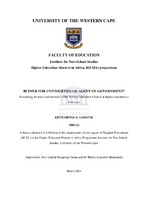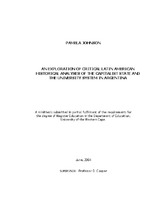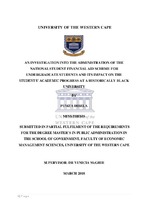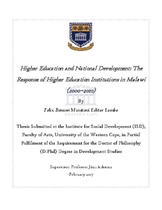Buffer for universities or agent of government? Examining the roles and functions of the Tertiary Education Council in higher education in Botswana
Abstract
The purpose of the study is to understand the roles, functions and perceived performance of the Tertiary Education Council (TEC) in higher education governance in Botswana. The study describes the relationship between the government, the TEC and higher education institutions in Botswana. The main objectives of the study are to: a) Examine the roles and functions of the TEC in Botswana’s higher education regarding policy formulation, quality assurance and coordination in the planning and development of tertiary education. b) Explore potential tensions between the roles and functions of the TEC and those of some of its stakeholders. c) Establish the performance of the TEC in relation to the three functions of policy formulation, quality assurance and coordination in the planning and development of tertiary education. The study is located within the broader framework of higher education governance. It examines the different models of higher education governance (such as state control, state interference and state supervision models) and the relationship involved between different stakeholders in governance of higher education. Furthermore, the framework focuses on the implications of the dynamics of higher education governance on the roles and functions of buffer bodies. The study adopted a single case study approach and it was designed to allow for the use of multiple sources of evidence. Data was collected through a review of both institutional and policy documents, semi-structured interviews with eight informants from the TEC and the Ministry of Education and Skills Development, as well as a survey targeting institutional heads of higher education institutions in Botswana. The use of qualitative and quantitative methods of data collection provided useful and in-depth data and allowed for triangulation. The data was analysed both quantitatively and qualitatively. The findings of the study reveal that there are differing conceptions of the TEC’s role in higher education in Botswana. Whereas the TEC sees itself as ‘middleman’ between the government and higher education institutions, the higher education institutions conceptualise the role of the TEC as an extension of government. The differing views on the TEC’s role, as either buffer or agent, result in different expectations of the roles and functions of the TEC. In addition, the study revealed that Botswana’s higher education system is characterised by fragmentation and duplication of roles, which limit the mandate of the TEC, thereby creating tensions between the TEC and other constituencies in the Botswana higher education system. The study thus contributes to the understanding of the roles and functions of the TEC in the governance of higher education in Botswana. It also contributes to the understanding of the relationship between the different stakeholders involved in the governance of higher education and the implications of this relationship on the roles and functions of buffer bodies. Overall, the study shows the complexities involved in the governance of higher education in a young and evolving system of higher education, and in a context in which the roles and functions of the key players are contested and inconsistently understood.
Collections
Related items
Showing items related by title, author, creator and subject.
-
An exploration of critical Latin American historical analyses of the capitalist state and the University system in Argentina
Johnson, Pamela (University of the Western Cape, 2004)This investigation into certain elements of critical Latin American Literature was prompted by the apparent post-1980s neglect by academics of Anglo-Saxon origin to engage with the state and social class, in the contextual ... -
An investigation into the administration of the National Student Financial Aid Scheme for undergraduate students and its impact on the students' academic progress at a historically Black university
Dibela, Pumza (University of the Western Cape, 2018)This study investigated the administration of the National Student Financial Aid Scheme (NSFAS) for undergraduate students and its impact on the students' academic progress at a Historically Black University (HBU) in the ... -
Higher education and national development: the response of higher education institutions in Malawi (2000–2010)
Lombe, Felix Benson Mwatani Editor (2013)Theoretically, the role of higher education in national development has become clearer than before, while empirically the evidence is overwhelming. Elsewhere in the world, countries that have made tremendous strides in ...




